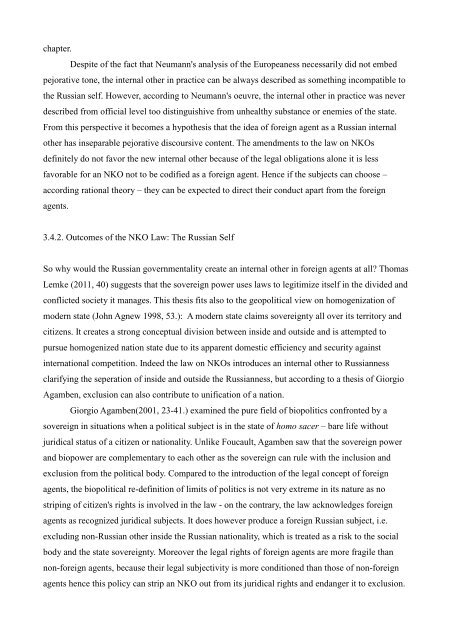Foreign Agents in Russia - Doria
Foreign Agents in Russia - Doria
Foreign Agents in Russia - Doria
Create successful ePaper yourself
Turn your PDF publications into a flip-book with our unique Google optimized e-Paper software.
47<br />
chapter.<br />
Despite of the fact that Neumann's analysis of the Europeaness necessarily did not embed<br />
pejorative tone, the <strong>in</strong>ternal other <strong>in</strong> practice can be always described as someth<strong>in</strong>g <strong>in</strong>compatible to<br />
the <strong>Russia</strong>n self. However, accord<strong>in</strong>g to Neumann's oeuvre, the <strong>in</strong>ternal other <strong>in</strong> practice was never<br />
described from official level too dist<strong>in</strong>guishive from unhealthy substance or enemies of the state.<br />
From this perspective it becomes a hypothesis that the idea of foreign agent as a <strong>Russia</strong>n <strong>in</strong>ternal<br />
other has <strong>in</strong>separable pejorative discoursive content. The amendments to the law on NKOs<br />
def<strong>in</strong>itely do not favor the new <strong>in</strong>ternal other because of the legal obligations alone it is less<br />
favorable for an NKO not to be codified as a foreign agent. Hence if the subjects can choose –<br />
accord<strong>in</strong>g rational theory – they can be expected to direct their conduct apart from the foreign<br />
agents.<br />
3.4.2. Outcomes of the NKO Law: The <strong>Russia</strong>n Self<br />
So why would the <strong>Russia</strong>n governmentality create an <strong>in</strong>ternal other <strong>in</strong> foreign agents at all? Thomas<br />
Lemke (2011, 40) suggests that the sovereign power uses laws to legitimize itself <strong>in</strong> the divided and<br />
conflicted society it manages. This thesis fits also to the geopolitical view on homogenization of<br />
modern state (John Agnew 1998, 53.): A modern state claims sovereignty all over its territory and<br />
citizens. It creates a strong conceptual division between <strong>in</strong>side and outside and is attempted to<br />
pursue homogenized nation state due to its apparent domestic efficiency and security aga<strong>in</strong>st<br />
<strong>in</strong>ternational competition. Indeed the law on NKOs <strong>in</strong>troduces an <strong>in</strong>ternal other to <strong>Russia</strong>nness<br />
clarify<strong>in</strong>g the seperation of <strong>in</strong>side and outside the <strong>Russia</strong>nness, but accord<strong>in</strong>g to a thesis of Giorgio<br />
Agamben, exclusion can also contribute to unification of a nation.<br />
Giorgio Agamben(2001, 23-41.) exam<strong>in</strong>ed the pure field of biopolitics confronted by a<br />
sovereign <strong>in</strong> situations when a political subject is <strong>in</strong> the state of homo sacer – bare life without<br />
juridical status of a citizen or nationality. Unlike Foucault, Agamben saw that the sovereign power<br />
and biopower are complementary to each other as the sovereign can rule with the <strong>in</strong>clusion and<br />
exclusion from the political body. Compared to the <strong>in</strong>troduction of the legal concept of foreign<br />
agents, the biopolitical re-def<strong>in</strong>ition of limits of politics is not very extreme <strong>in</strong> its nature as no<br />
strip<strong>in</strong>g of citizen's rights is <strong>in</strong>volved <strong>in</strong> the law - on the contrary, the law acknowledges foreign<br />
agents as recognized juridical subjects. It does however produce a foreign <strong>Russia</strong>n subject, i.e.<br />
exclud<strong>in</strong>g non-<strong>Russia</strong>n other <strong>in</strong>side the <strong>Russia</strong>n nationality, which is treated as a risk to the social<br />
body and the state sovereignty. Moreover the legal rights of foreign agents are more fragile than<br />
non-foreign agents, because their legal subjectivity is more conditioned than those of non-foreign<br />
agents hence this policy can strip an NKO out from its juridical rights and endanger it to exclusion.
















